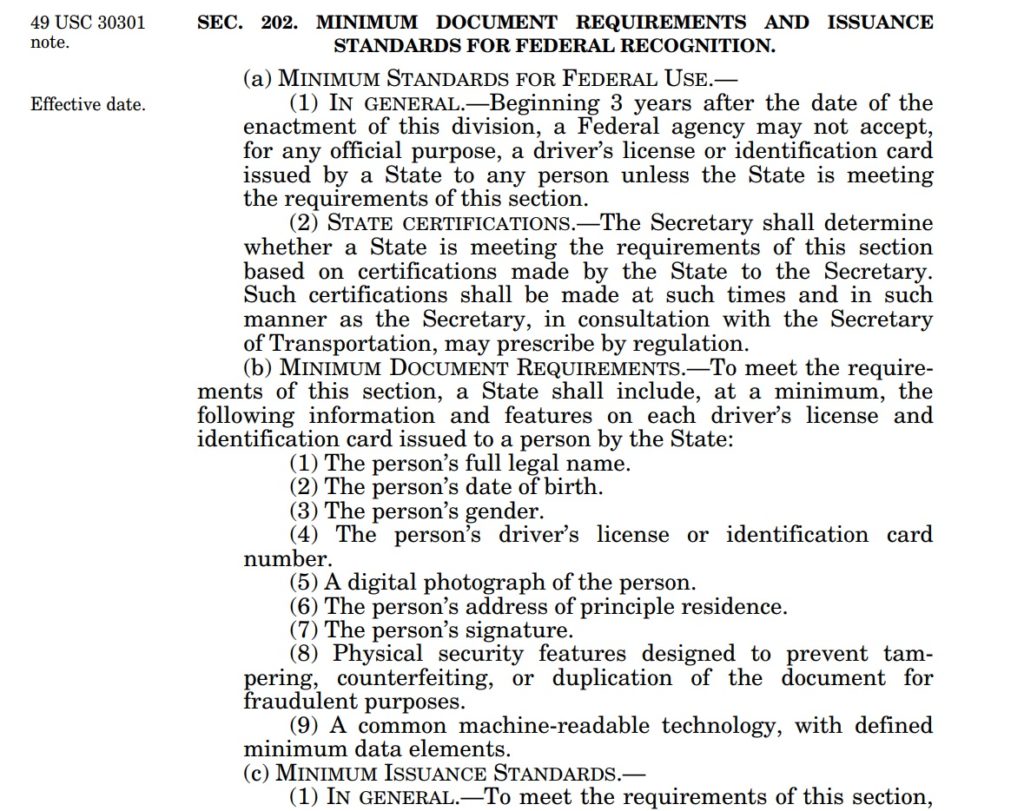Can something like the REAL ID Act of 2005 be used to solve the beneficial ownership issue?
Even with a national registry of beneficial ownership (BO) information, law enforcement agencies and financial institutions have no way to verify whether named beneficial owners of companies are, in fact, beneficial owners.
The REAL ID Act of 2005 compelled the 50 states to have their citizens’ state-issued identification documents meet certain minimum requirements and issuance standards … could a similar thing be done to compel the 50 states to have their state-created legal entities meet certain minimum requirements for beneficial ownership information?
The REAL ID Act of 2005 established minimum security standards for state-issued driver’s licenses and identification cards by prohibiting Federal agencies from accepting non-compliant state-issued driver’s licenses and identification cards that do not meet the Act’s minimum standards. The REAL ID Act was a way for the Federal Government to compel (sort of) the fifty states to meet certain standards for their drivers’ licenses. The Federal Government essentially told the fifty states “you have the power to issue state drivers’ licenses, and you can do what you’d like, but if you want those licenses to be used for any federal purposes, such as accessing Federal facilities, entering nuclear power plants, and, notably, boarding federally regulated commercial aircraft, then they have to meet our standards.”
The REAL ID Act’s genesis was the attacks of 9/11. It enacted recommendations from the July 2002 National Strategy for Homeland Security and the July 2004 9/11 Commission Report that the Federal Government “set standards for the issuance of sources of identification, such as driver’s licenses.” The REAL ID Act was included in the Emergency Supplemental Appropriation for Defense, the Global War on Terror, and Tsunami Relief Act of 2005 (PL 109-13, 119 Stat. 231 at 302), and the actual ID provisions are in Title II, Improved Security for Drivers’ Licenses and Personal Identification Cards, section 202, “minimum document requirements and issuance standards for federal recognition.” (Section 204 provides for grants to states to implement the document requirements and issuance standards).
The main part of section 202 provides:
REAL ID Act regulations weren’t finalized until January 2008, at which time it was clear that it would take billions of dollars and many years to get states into compliance. States were originally required to be compliant by May 2008 (the regulations weren’t published until January 2008). That deadline was extended multiple times to 2009, then 2011, then 2013, then 2015, and extended again to January 22, 2018. As of April 2018, only thirty states were compliant and the remaining twenty had obtained extensions. For those with non-compliant driver’s licenses issued by compliant states, they have until October 1, 2020 to get a compliant driver’s license.
[UPDATE – in mid-2020, in the midst of the COVID-19 pandemic, non-compliant states’ efforts to meet the October 2020 deadline were stalled. The October 2020 deadline was extended to April 2021, then to May 2023, then to May 7, 2025]
To find out more about the REAL ID Act requirements, California’s DMV site has a good section: CA DMV on REAL ID Act. The Transportation Security Agency also has a good section.
Can’t Board an Airplane … Can’t Bid on Federal Contracts
How could something like the REAL ID Act help banks with the beneficial ownership issue? Like driver’s licenses, creation of legal entities is left to each state, and (anecdotally) only three states currently require the collection and verification of beneficial ownership information.
Like they did to effectively compel the fifty states to issue individuals’ driver’s licenses that met federal standards, the federal government could pass a law that would prevent entities created in states that do not meet certain Beneficial Ownership standards from bidding on and winning federal government contracts. In other words, those states would not be compelled to collect, verify, and maintain accurate beneficial ownership information on state-incorporated legal entities, but would need to have an incorporation regime that did so if it wanted those legal entities to be able to bid on federal government contracts.
This might be a radical idea, full of legal and regulatory pitfalls. There might be dozens of reasons why it can’t work. But it might work. Or something similar could work (it doesn’t have to be about bidding on federal contracts). But there must be something that could work. As Arthur C. Clarke wrote, “new ideas pass through three phases: it can’t be done; it probably can be done, but it’s not worth doing; I knew it was a good idea all along!”
One word of further caution. It will have taken twenty years for all states to comply with the REAL ID Act of 2005 requirements. Hopefully it wouldn’t take states twenty years to comply with the REAL Beneficial Owners Act of 2019.

